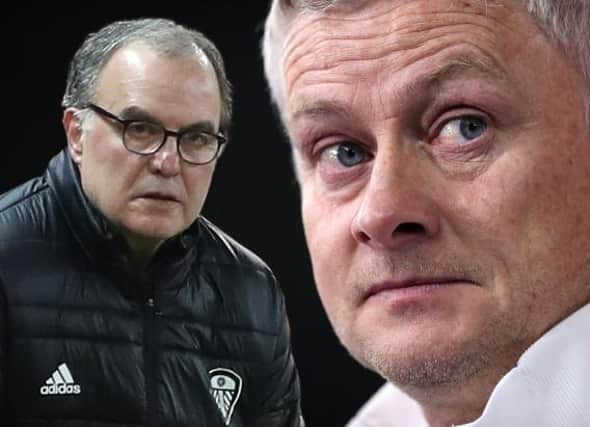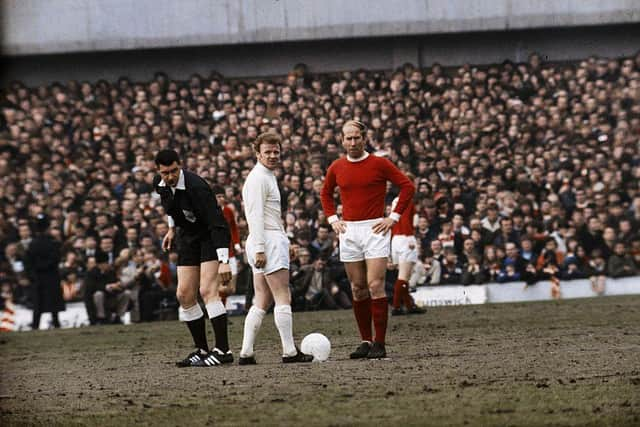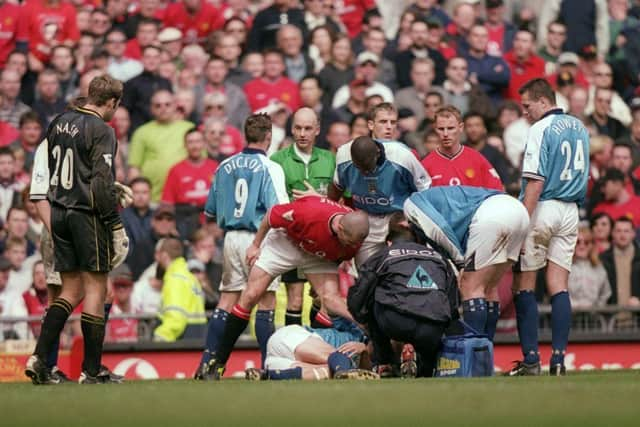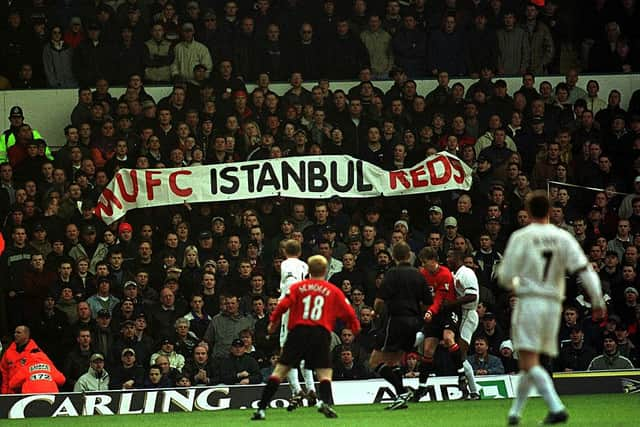Why do Leeds United hate Manchester United? The story behind one of football's fiercest rivalries


Leeds United host old foes Manchester United this weekend in a Premier League clash which will set the pulses racing.
It is the first meeting between the two sides at Elland Road in a league game in 17 years and while fans won’t be inside the stadium, there is bound to be an edge to the contest.


Advertisement
Hide AdAdvertisement
Hide AdBut why do the two clubs hate each other? What is the history behind one of the more remarkable ‘derbies’?
War of the Roses
One easy explanation is that it is a sporting manifestation of the established rivalry between the counties of Yorkshire and Lancashire, loosely traced back to the Wars of the Roses – a series of bloody battles during the 15th century.
The colours of each football team's home shirts fittingly correspond to the respective rose representing their historic county – Leeds with a white kit, resembling the Yorkshire rose and Manchester United with a red shirt, like the Lancashire rose.


The two teams may not be ‘derby’ rivals – the two cities are 40 miles away from each other, but it is a
1960s and beyond – Busby v Revie
Advertisement
Hide AdAdvertisement
Hide AdThe rivalry intensified during the 1960s as both clubs began to establish themselves as powerhouses of the English game.
Sir Matt Busby was building a young, vibrant Man United side in the aftermath of the 1958 Munich air disaster, while Don Revie had taken charge of Leeds and was moulding them into a tough, uncompromising side.


Both teams were littered with players who would become legends of the game – Man United had Bobby Charlton, George Best and Denis Law while Leeds had Bobby's brother Jack Charlton, Billy Bremner, and Norman Hunter, along with Johnny Giles, who joined Leeds from Manchester United for £33,000 in 1963.
In 1965, the two sides met in the FA Cup semi-final at Hillsborough. With both sides going for the Double, the clash turned into a ragged, violent draw. There was Nobby Stiles's early dreadful tackle on Leeds' left-winger Albert Johanneson and running battles between Jack Charlton and Denis Law, and Billy Bremner and Pat Crerand.
Advertisement
Hide AdAdvertisement
Hide AdThe replay, at Nottingham Forest’s City Ground four days later, was no better, settled in Leeds’ favour by Billy Bremner's 89th-minute goal. Man United, though, had the last laugh, pipping Leeds to the title on goal average while Revie's team.
The ill feeling on the pitch, however, had also spread to the terraces and scuffles, fights and assaults were reported by the city constabularies of Sheffield and Nottingham – something that was to become a hallmark of the clashes between the two sides over the next couple of decades as hooliganism became rife in English football.
Through the late 60s and early to mid 1970s, Leeds became more dominant than their Manchester rivals, who were relegated in 1974 as Leeds won the title. However, perceived media bias fed into Leeds’ fans feelings of hate for Man United – their rivals were ‘always shown first on Match of the Day’, and ‘BBC stood for Busby, Best and Charlton’.
The two teams met in another explosive FA Cup semi-final at Hillsborough in 1977. The match was labelled 'The Battle of the Roses' on the cover of the official matchday programme and there was extensive violent clashes between supporters outside the stadium both before and after the match plus during the match inside the stadium, with numerous arrests and injuries.
Advertisement
Hide AdAdvertisement
Hide AdIn 1978, Leeds sold two of their star players, fan favourite Gordon McQueen and Joe Jordan, to Man United. Both players received a tonne of abuse on their return to Elland Road the following season.
The Premier League years
Leeds had a long stint in the Second Division in the 1980s, but the rivalry was renewed when they were promoted in 1990, and under Howard Wilkinson they won the First Division title in 1992, the last one before the advent of the Premier League. It became a straight shoot-out between Leeds and Man United, with Leeds prevailing by four points –famously the players watching the Red Devils lose against Liverpool from Lee Chapman’s settee to hand them the crown.
However, the following season they controversially sold Eric Cantona to Sir Alex Ferguson’s side – Cantona went on to become the catalyst for Man United’s revival and dominance in the rest of that decade.
On-pitch clashes continued to happen between the clubs. There was the infamous personal grudge between Manchester United captain Roy Keane and Alf-Inge Haaand in September 1997, while there was also a clash between Ian Harte and Fabien Barthez in March 2001 in which the French goalkeeper stamped on the Leeds player’s shin.
Istanbul and Munich
Advertisement
Hide AdAdvertisement
Hide AdTwo Leeds United fans were stabbed to death during a UEFA Cup game against Galatasaray in 2000.
Many Manchester United fans paid their respects, leaving tributes at Elland Road. However, by the time the two sides faced up in the league, a subsection of Manchester United fans unfurled banners bearing the words "MUFC Istanbul Reds" and "Galatasaray Reds", glorifying the killers and mocking the victims.
Manchester United fans claimed to have been retaliating to consistent taunting by Leeds fans about the Munich air disaster over the years but these banners angered the Leeds fans, who retorted by chanting songs about Munich, and there were reports of seats being ripped up and confrontations after the game.
After the 2011 League Cup game between the two sides, West Yorkshire Police opened an investigation into chants from both sets of fans, about the Munich air disaster and the murder of two Leeds fans in Turkey.